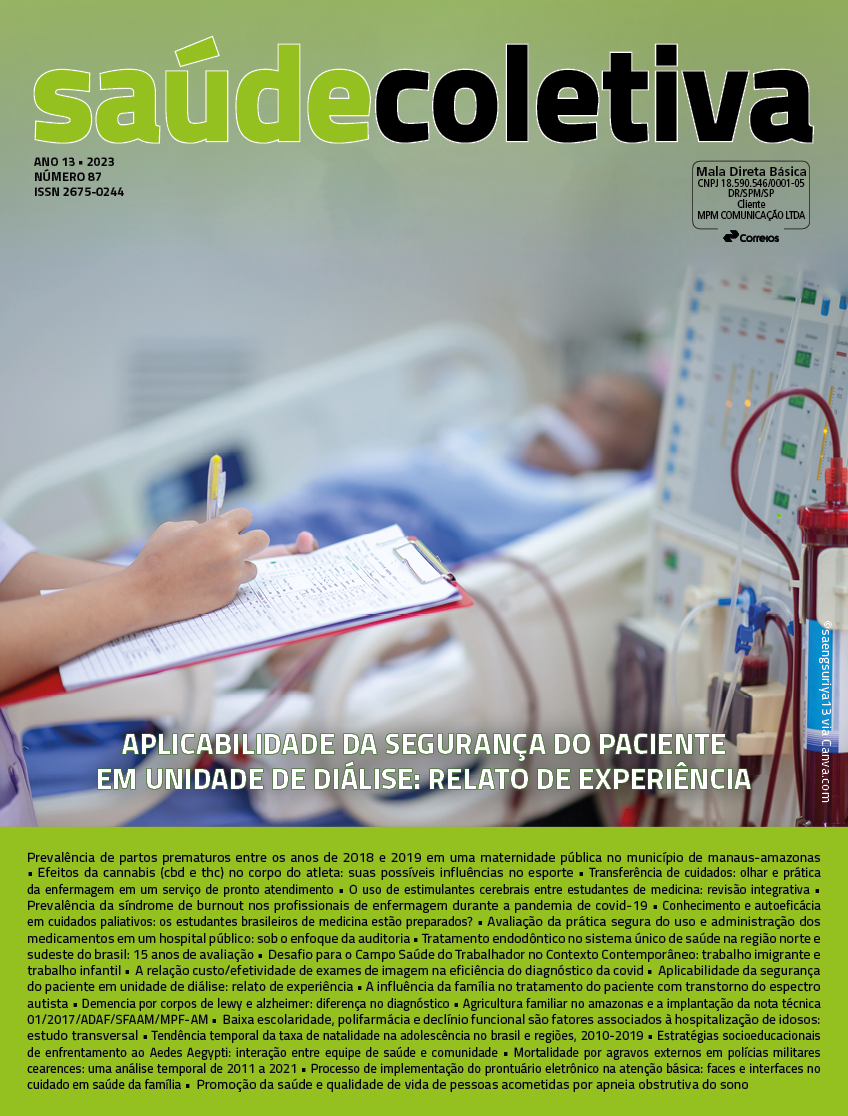CONHECIMENTO E AUTOEFICÁCIA EM CUIDADOS PALIATIVOS: OS ESTUDANTES BRASILEIROS DE MEDICINA ESTÃO PREPARADOS ?
DOI:
https://doi.org/10.36489/saudecoletiva.2023v13i87p12897-12915Resumen
Introdução: Os cuidados paliativos (CP) são considerados parte integrante dos sistemas de cuidados da saúde e um elemento inalienável do direito dos cidadãos. Estudos têm demonstrado que médicos não recebem treinamento formal em comunicação e outros aspectos essenciais ao lidar com pacientes terminais. O objetivo desse trabalho foi avaliar o grau de conhecimento em CP de estudantes de medicina do quarto, quinto e sexto ano de uma universidade pública do Estado de São Paulo, Brasil. Os dados foram coletados na forma de questionário on-line, com preenchimento anônimo, realizado de forma totalmente voluntária. Os questionários abordavam características pessoais e suas relações com CP, bem como o “Teste Bonn sobre conhecimento em cuidados paliativos” e um questionário de autoeficácia sobre CP. O total de participantes do estudo foi de 105 alunos, sendo 71,4% do sexo feminino, com média de idade de 24,5 anos ±2,1 anos. A média total de acertos do “Teste Bonn sobre conhecimento em cuidados paliativos” foi de 66,96%, quanto ao questionário de autoeficácia a média de concordância foi de 64,75%, e todos os participantes consideram importante a incorporação de conteúdos de CP no currículo médico. Dessa maneira, conclui-se que o conhecimento dos estudantes de medicina em geral é insuficiente, mesmo com parte deles tendo curso teórico em CP durante a graduação.
Citas
-World Health Organization. WHO definition of palliative care [Internet]. Disponivel : www.who.int/cancer/palliative/definition/en/. Acesso em 15/04/2023
-Gómez-Batiste X, Blay C, Roca J, Fontanals MD. Innovaciones conceptuales e iniciativas de mejora en la atención paliativa del siglo XXI. Med Paliat. 2012; 19(3):85-86. DOI: https://doi.org/10.1016/j.medipa.2012.05.006
-Comité de Ministros del Consejo de Europa. Recomendación Rec (2003) 24 del Comité de Ministros de los estados miembros sobre organización de cuidados paliativos.
- Carência no atendimento. Revista APM. 2007;(583):20-21.
- Schonwetter RS. The emergence of palliative care. Cancer Control. 2001;8(1):3-5. Editorial. DOI: https://doi.org/10.1177/107327480100800101
Blasco PG. O médico de família hoje. São Paulo: SOBRAMFA;1997.
-Carvalho RT, Parsons HA. Manual de Cuidados Paliativos ANCP - 2ª edição. ANCP (Academia Nacional de Cuidados Paliativos); 2012.
-Diver R, Quince T, Barclay S, Benson J, Brimicombe J, Wood D, Thiemann P. Palliative care in medical practice: medical students' expectations. BMJ Supportive & Palliative Care 2018;8:285–288. DOI: https://doi.org/10.1136/bmjspcare-2017-001486
-Anneser, J, Kunath, N, Krautheim, V, Borasio, GD. Needs, expectations, and concerns of medical students regarding end-of-life issues before the introduction of a mandatory undergraduate palliative care curriculum. J Palliat Med. 2014;17(11):1201–1205. DOI: https://doi.org/10.1089/jpm.2013.0614
-Stepanyan KD, Weiss TE, Pessegueiro AM, Pietras CJ. Lessons From the Development and Implementation of a Palliative Care Elective for Fourth-Year Medical Students: A Pilot Study. Am J Hosp Palliat Care. 2020;37(3):191-195. DOI: https://doi.org/10.1177/1049909119872976
-Rai A, Mason S. The developing and evaluation of an electronic tool to assess the effect of undergraduate training in palliative care: the electronic international medical education in palliative care (IMEP-e) assessment tool. BMC Palliat Care. 2019; 18(1):76. DOI: https://doi.org/10.1186/s12904-019-0460-3
-Fraser, HC, Kutner, JS, Pfeifer, MP. Senior medical students’ perceptions of the adequacy of education on end-of-life issues. J Palliat Med. 2001;4(3):337–343. DOI: https://doi.org/10.1089/109662101753123959
-Minosso JSM, Martins MMFPS Martins, Oliveira MAC. Adaptação transcultural do Bonn Palliative Care Knowledge Test: um instrumento para avaliar conhecimentos e autoeficácia. Rev. Enf. Ref. 2017;(13):31-42. DOI: https://doi.org/10.12707/RIV16076
-Gomez-Batiste X, Connor S, editors. Building Integrated Palliative Care Programs & Services. Catalonia: Liberdúplex; 2017.
-Knaul FM, Farmer PE, Krakauer EL, De Lima L, Bhadelia A, Jiang Kwete X, Arreola-Ornelas H, Gómez-Dantés O, Rodriguez NM, Alleyne GAO, Connor SR, Hunter DJ, Lohman D, Radbruch L, Del Rocío Sáenz Madrigal M, Atun R, Foley KM, Frenk J, Jamison DT, Rajagopal MR; Lancet Commission on Palliative Care and Pain Relief Study Group. Alleviating the access abyss in palliative care and pain relief-an imperative of universal health coverage: the Lancet Commission report. Lancet. 2018 Apr 7;391(10128):1391-1454. DOI: https://doi.org/10.1016/S0140-6736(17)32513-8
-Pfister D, Muller M, Muller S, Kern M, Rolke R, Radbruch L. Validation of the Bonn test for knowledge in palliative care (BPW). Schmerz. 2011;25(6):643–53. DOI: https://doi.org/10.1007/s00482-011-1111-7
-Nakazawa Y, Miyashita M, Morita T, Umeda M, Oyagi Y, Ogasawara T. The palliative care knowledge test: reliability and validity of an instrument to measure palliative care knowledge among health professionals. Palliat Med. 2009;23(8):754–66. DOI: https://doi.org/10.1177/0269216309106871
-Wilson O, Avalos G, Dowling M. Knowledge of palliative care and attitudes towards nursing the dying patient. Br J Nurs. 2016;25(11):600–5. DOI: https://doi.org/10.12968/bjon.2016.25.11.600
-Kassa H, Murugan R, Zewdu F, Hailu M, Woldeyohannes D. Assessment of knowledge, attitude and practice and associated factors towards palliative care among nurses working in selected hospitals, Addis Ababa, Ethiopia. BMC Palliat Care. 2014;13(1):6. DOI: https://doi.org/10.1186/1472-684X-13-6
-Ayed A, Sayej S, Harazneh L, Fashafsheh I, Eqtait F. The Nurses' knowledge and attitudes towards the palliative care. J Educ Pract. 2015;6(4):91–9.
-Huijer AH, Dimassi H. Palliative care in Lebanon: knowledge, attitudes and practices of physicians and nurses. J Med Liban. 2007;55(3):121–8.
-Budkaew J, Chumworathayi B. Knowledge and attitudes toward palliative terminal cancer care among Thai generalists. Asian Pac J Cancer Prev. 2013; 14(10):6173–80. DOI: https://doi.org/10.7314/APJCP.2013.14.10.6173
-Snyder S1, Hazelett S, Allen K, Radwany S. Physician knowledge, attitude, and experience with advance care planning, palliative care, and hospice: results of a primary care survey. Am J Hosp Palliat Care. 2013 Aug;30(5):419-24. DOI: https://doi.org/10.1177/1049909112452467
-Krautheim V, Schmitz A, Benze G et al. Self-confidence and knowledge of German ICU physicians in palliative care – a multicentre prospective study. BMC Palliat Care, 2017;16(1):57. DOI: https://doi.org/10.1186/s12904-017-0244-6
-Henderson A, Rowe J, Watson K, Hitchen-Holmes D. Graduating nurses' self-efficacy in palliative care practice: An exploratory study. Nurse Educ Today. 2016; 39:141-146. DOI: https://doi.org/10.1016/j.nedt.2016.01.005
-Spineli VMCD. Conhecimento e autoeficácia em cuidados paliativos da enfermeiros da atenção primária à saúde (tese). São Paulo. Escola de Enfermagem;2019.







